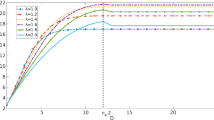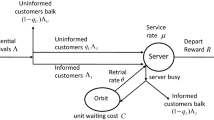Abstract
In this paper, we incorporate loss preference into an M/M/1 queueing with a threshold disclosure policy and analyze its impact on the customers’ queueing strategies and the queueing system’s idle stationary probability. In the queueing system, customers are strategic and divided into two groups: the informed and the uninformed. Informed customers are assumed to be fully rational, whereas uninformed customers are assumed to have loss preference. Uninformed customers with loss preference are categorized into two types according to their asymmetry perceptions, which anchor on the difference between gain and loss: loss neutrality and loss aversion. We firstly determine customers’ equilibrium decisions, and then derive the idle stationary probability at equilibrium. We find that loss preference reduces the customers’ joining probability, and results in a higher idle stationary probability. Furthermore, we find that for the uninformed customers with stronger loss aversion, the system manager should lower the threshold of disclosure to maintain a stable demand of uninformed customers. In addition, in the case of mixed-strategy at equilibrium, with the increase of the threshold of disclosure, the idle stationary probability increases for an underloaded queue. However, for an overloaded queue, the idle stationary probability decreases with increasing the threshold of disclosure.

Similar content being viewed by others
Data Availability
Data sharing is not applicable to this article as no datasets were generated or analysed during the current study.
References
Anderson EW, Sullivan MW (1993) The antecedents and consequences of customer satisfaction for firms. Mark Sci 12(2):125–143
Cao P, Wang Y, Xie J (2019) Priority service pricing with heterogeneous customers: Impact of delay cost distribution. Prod Oper Manag 28(11):2854–2876
Chen H, Frank M (2004) Monopoly pricing when customers queue. IIE Trans 36(6):569–581
Courty P, Nasiry J (2018) Loss aversion and the uniform pricing puzzle for media and entertainment products. Econ Theor 66(1):105–140
De Borger B, Glazer A (2017) Support and opposition to a Pigovian tax: Road pricing with reference-dependent preferences. J Urban Econ 99:31–47
De Giorgi EG, Post T (2011) Loss aversion with a state-dependent reference point. Manage Sci 57(6):1094–1110
Debo LG, Parlour C, Rajan U (2012) Signaling quality via queues. Manage Sci 58(5):876–891
Edelson NM, Hilderbrand DK (1975) Congestion tolls for Poisson queuing processes. Econometrica: J Econom Soc 43(1):81–92
Guo P, Haviv M, Luo Z, Wang Y (2022) Optimal queue length information disclosure when service quality is uncertain. Prod Oper Manag 31(5):1912–1927
Hassin R, Haviv M (2006) To queue or not to queue: Equilibrium behavior in queueing systems. Springer Science and Business Media
Haviv M, Randhawa RS (2014) Pricing in queues without demand information. Manuf Serv Oper Manag 16(3):401–411
Heidhues P, Kőszegi B (2004) The impact of consumer loss aversion on pricing. Available at SSRN https://doi.org/10.2139/ssrn.658002
Heidhues P, Kőszegi B (2008) Competition and price variation when consumers are loss averse. Am Econ Rev 98(4):1245–1268
Heidhues P, Kőszegi B (2014) Regular prices and sales. Theor Econ 9(1):271–251
Hu M, Li Y, Wang J (2018) Efficient ignorance: Information heterogeneity in a queue. Manage Sci 64(6):2650–2671
Kahneman D, Tversky A (1979) Prospect theory: An analysis of decision under risk. Econometrica 47(2):263–292
Kim B, Kim J (2017) Optimal information disclosure policies in a strategic queueing model. Oper Res Lett 45(2):181–186
Kőszegi B, Rabin M (2006) A model of reference-dependent preferences. Q J Econ 121(4):1133–1165
Li K, Cui S, Wang J (2021) On the optimal disclosure of queue length information. Nav Res Logist 68(5):615–630
Lindsey R (2011) State-dependent congestion pricing with reference-dependent preferences. Transp Res Part B 45(10):1501–1526
Naor P (1969) The regulation of queue size by levying tolls. Econometrica: J Econom Soc 37(1):15–24
Shalev J (2000) Loss aversion equilibrium. Internat J Game Theory 29(2):269–287
Simhon E, Hayel Y, Starobinski D, Zhu QY (2016) Optimal information disclosure policies in strategic queueing games. Oper Res Lett 44(1):109–113
Yang L, Guo P, Wang Y (2018) Service pricing with loss-averse customers. Oper Res 66(3):761–777
Zhou W, Wang D, Huang W, Guo P (2021) To pool or not to pool? The effect of loss aversion on queue configurations. Prod Oper Manag 30(11):4258–4272
Zhu H, Yu Y, Ray S (2021) Quality disclosure strategy under customer learning opportunities. Prod Oper Manag 30(4):1136–1153
Acknowledgements
The authors thank editors and two referees for their excellent suggestions that have substantially improved this study. This work was supported by National Natural Science Foundation of China under grants 11871116 and 11971074, and also by the Fundamental Research Funds for the Central Universities of China under Grant No. 2019XD-A11.
Author information
Authors and Affiliations
Corresponding author
Ethics declarations
Conflict of Interest
The authors declare no conflict of interest.
Additional information
Publisher's Note
Springer Nature remains neutral with regard to jurisdictional claims in published maps and institutional affiliations.
Rights and permissions
Springer Nature or its licensor (e.g. a society or other partner) holds exclusive rights to this article under a publishing agreement with the author(s) or other rightsholder(s); author self-archiving of the accepted~manuscript version of this article is solely governed by the terms of such publishing agreement and applicable law.
About this article
Cite this article
Cao, J., Guo, Y. & Hu, Z. The Effect of Loss Preference on Queueing with Information Disclosure Policy. Methodol Comput Appl Probab 25, 75 (2023). https://doi.org/10.1007/s11009-023-10047-w
Received:
Revised:
Accepted:
Published:
DOI: https://doi.org/10.1007/s11009-023-10047-w




